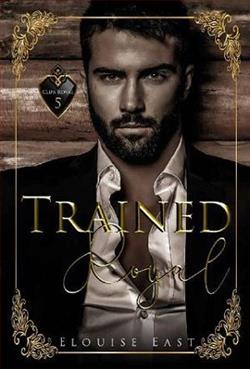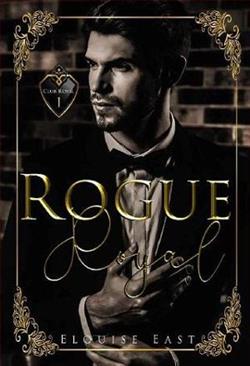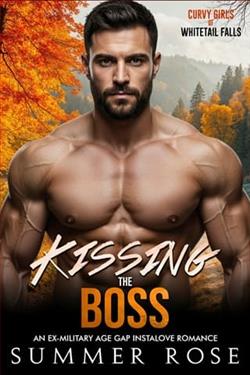Page 43 of Craving Their Venom
The court is frozen, caught between the King’s temporal power and the Mystic’s spiritual authority. It is a battle for the very soul of Nagaland.
“Lies!” my father shrieks, his voice thin and reedy. “All of it! The ravings of a madman and the ambitions of a traitor! I am the King!”
“Youwerethe King,” I say, my voice the final, cold, and absolute judgment. I turn to the Captain of the Royal Guard, a stoic, scarred naga whose loyalty I have spent years cultivating. “Captain Rhax. Your orders are clear. The evidence is before you. The will of the gods has been spoken. Who do you serve?A tyrant who conspires with our enemies? Or the future of Nagaland?”
The Captain hesitates for a single, eternal heartbeat. He looks at the sputtering, raging King on his throne. He looks at me, at Zahir, at Kaelen. He sees the unified, unbreakable front we present. He sees the future.
He draws his sword, the sound of steel a clear, ringing note in the tense silence. He turns not to me, but to his men. “The Prince has spoken,” he commands, his voice a clear, authoritative bark. “The King is a traitor. Seize him.”
The Royal Guard moves as one. They converge on the throne, a wave of black armor and drawn steel. My father screams, a sound of pure, impotent rage, as they drag him from his obsidian seat. He fights, a weak, pathetic struggle, his threats and curses lost in the disciplined, efficient movements of the guards.
The court is in an uproar, a chaotic mess of fear and dawning, opportunistic realignment. I watch as they drag my father away, a broken, dethroned tyrant. The prophecy is fulfilled. The old king has fallen.
I feel no triumph. No satisfaction. Only a vast, hollow emptiness. And a new, terrifying weight. The weight of a crown I have just claimed in blood and betrayal.
I turn, my gaze sweeping past the cowering nobles, past the chaos, to the small, arched doorway at the side of the hall where I had Kaelen bring her. Amara stands there, a silent, pale witness to the entire, brutal spectacle. Her eyes are wide, her face a mask of shock and a dawning, terrible understanding.
I have just overthrown a kingdom. I have faced down my father, my own blood, and torn his legacy to shreds. I have done it all for her. My actions have matched my words.
I look at her, and my heart, the one I thought was made of ice, aches with a single, desperate question.
Is it enough? Can you believe us now?
29
AMARA
Three months. A season of change. A lifetime. The ghost of the old King haunts the palace, a chill in the air that really has very little to do with the changing weather. He is locked away in the deepest, most lightless dungeon, a fate he once dealt to countless others. The kingdom breathes a collective, hesitant sigh of relief. But a kingdom is not a single entity. It is a writhing nest of vipers, and though the head has been severed, the body still twitches with the old poisons.
I’m not a prisoner in the Prince’s—theKing’s—chambers. I reside in a suite of my own, a quiet, sun-drenched space with a balcony that overlooks the city, not a sterile, walled garden. The door is not locked. I am free to walk the palace halls, to visit the grand library, to sit in the gardens. And yet, I am never truly alone. One of them is always near. Not as a guard, but as a silent, watchful presence. A shadow of gold, or crimson, or silver-blue.
They are keeping their promise. Their actions have become a slow, patient, and relentless assault on the walls I have built around my broken heart.
Varos, the new King, is a creature transformed. The cold, calculating Prince is still there, a core of ice at the center of hisbeing. But it is now tempered by a strange, new fire. I see it in the council meetings he insists I attend. He sits on the obsidian throne, no longer a tyrant, but a true monarch, his voice a low, authoritative command that silences the squabbling nobles.
Last week, Lady Xaliya, her violet scales shimmering with cunning, proposed a new tax on the human territories, a measure to “replenish the royal coffers after the recent unrest.” The old King would have agreed without a second thought. Varos listened, his face an unreadable mask. Then he turned his golden eyes to me.
“Amara,” he said, his voice ringing with a clear, carrying authority that made the entire court fall silent. “You are of human blood. You understand their ways. Is this a just tax?”
The entire hall held its breath. Lady Xaliya’s fan stilled. I, a human, a former pet, was being asked to advise the King of Nagaland on matters of state. My heart hammered against my ribs, but I met his gaze and found not a test, but a genuine inquiry.
“It is a death sentence, Your Majesty,” I said, my voice quiet but steady. “The harvests have been poor. They are already starving.”
Varos turned his gaze back to a sputtering Lady Xaliya. “Then there will be no new tax,” he declared, his voice the final, absolute judgment. “Instead, we will send grain from the royal stores. A kingdom that cannot feed its most vulnerable subjects is a kingdom that has already failed.”
He did not do it for me. He did it for his kingdom. But he used my voice, my knowledge, to guide his hand. He is showing me, not telling me, that my humanity is not a weakness to him. It is a strength. His strength.
As for Zahir, his lessons continue, but they are no longer a brutal torment. We meet in his training yard, in the honest lightof the sun. He is teaching me to wield a small, light dagger, its hilt carved from the pale, creamy wood he favors.
“Your strength is not in your arm,” he grunts, his massive hands gently correcting my grip. His touch is still a jolt, a raw, electric thing, but the violence is gone, instead replaced by a rough, patient tenderness. “It is here.” He taps his claw against my temple. “You see what others do not. You see the weakness in an opponent’s stance, the flicker of fear in their eyes. That is your weapon. The blade is merely the extension of your will.”
He no longer pushes me to the ground. He teaches me to yield, to flow, to use an opponent’s strength against them. He is not just teaching me to fight. He is teaching me to be something other than prey. He is giving me back my own agency, piece by painstaking piece.
One afternoon, he leads me back to his secret workshop. A new carving sits on the central bench, bathed in a sliver of sunlight. It is a carving of me. I am not depicted as a cowering captive or a seductive pet. I am standing, my chin lifted, a small, defiant smile on my lips. In my hand, I hold a single, perfect flower. He has captured not just my likeness, but my spirit.
“I… I found this one in the garden,” he says. His voice is a rough rumble, his gaze fixed on the carving, unable to meet my eyes. “It was not broken. It was just… alone.”
My heart aches with a sweet, terrible pain. This brutal, savage warrior, this creature of blood and battle, sees me not as a broken thing to be pitied, but as a solitary bloom to be cherished.















